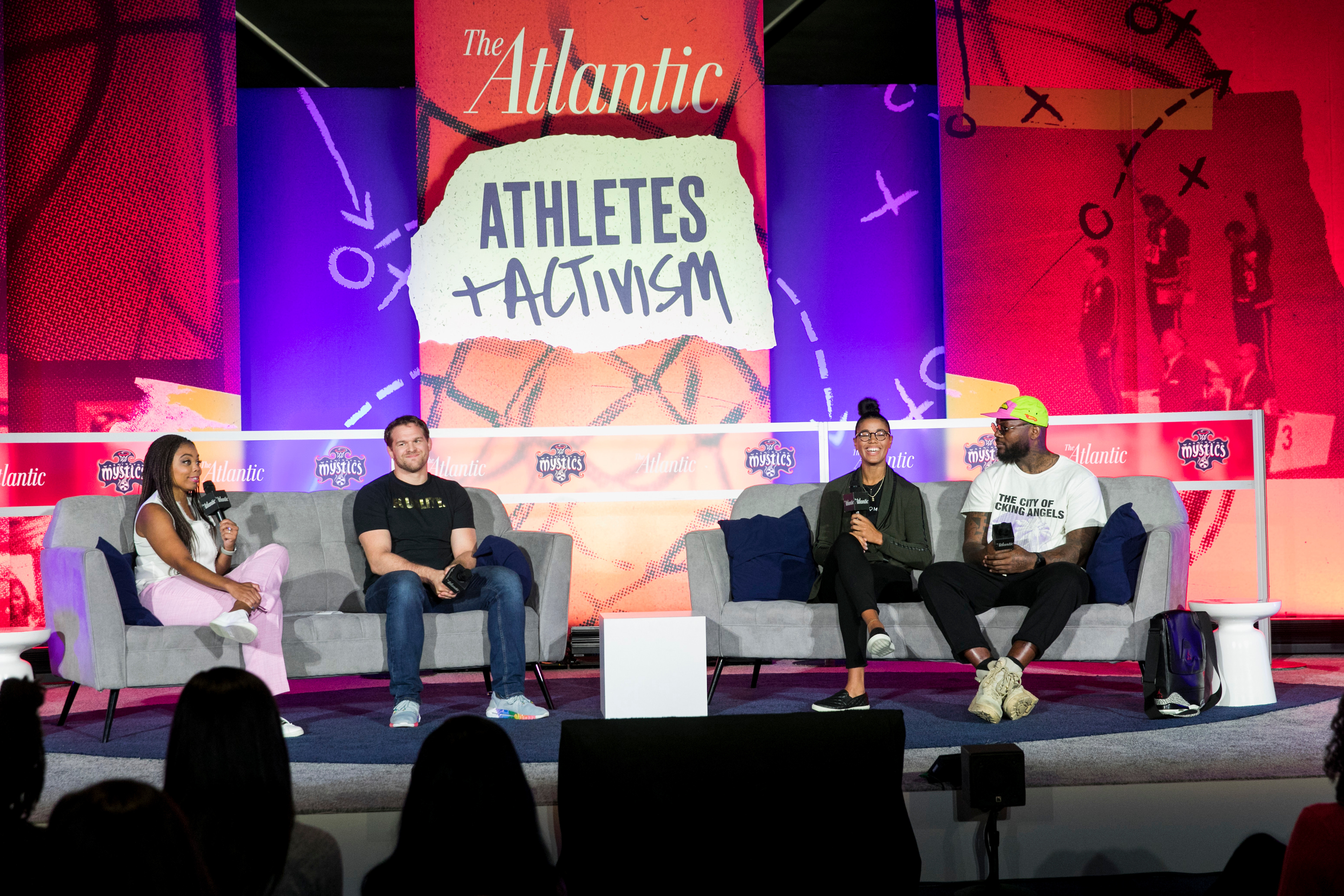From raising fists at the Olympics to kneeling on one knee during the National Anthem, athletes throughout history have found various ways to use their platform to draw attention to causes important to them. More times than not, these gestures have been met with criticism and in some cases the narrative has been changed to fit societal norms. These iconic moments and important issues were discussed in a series of conversations at The Atlantic’s Athletes + Activism event made possible by the Washington Mystics.
This first of its kind event explored the intersection of sports and social change with athletes and influencers such as Olympic medalist Dr. John Carlos, known for his Black Power salute from the podium in the 1968 games, Washington Mystics guard Natasha Cloud, hockey star Hilary Knight, two-time Olympic medalist Briana Scurry, Olympic medalist Ibtihaj Muhammad, former NFL player Martellus Bennett, and more.
During a time when athletes are told to “stick to sports” or fear punishment for standing up for what they believe in, Athletes + Activism shed light on these critical topics.
“I think it’s important for athletes to have a space in which it’s okay for them to express and support a lot of issues they are passionate about,” Atlantic staff writer and program moderator Jemele Hill said. “I think they can be made to feel by larger society that because they’re professional athletes or because maybe in some cases they’ve risen to a certain income level, that they should just be content with what they have and let society just work itself out.”
“With a conference or platform like this one, they’re able to remind people of what they care about,” Hill continued. “They don’t just care about their sport. They’ve done a lot of things to try to support their individual communities. It’s just another way of making athletes, especially athletes of color, feel like they have a sense of belonging.”
Had the honor of interviewing @jemelehill at Athletes + Activism. Below we discuss the event and her thoughts on ‘stick to sports’: “I think it’s important that athletes feel like they have a space in which it’s ok to support alot of issues they are passionate about.’ pic.twitter.com/OpGRnkqYan
— Carita Parks (@CaritaCParks) May 31, 2019
Super Bowl Champion Martellus Bennett, who participated in a panel titled “The Big Picture,” believes that it’s not just the responsibility of athletes to speak up about social issues. In his opinion, anybody with a platform has a voice.
“I think this is a conversation everyone should have,” Bennett said. “It’s not just people who have a big platform or small platform. Every platform matters because you are in your community. For us to be able to be the voice of the voiceless for those who can’t be heard and be a reflection of our community, we have to speak on their behalf when we get a chance to. It’s really important for everyone to use their platform no matter how big or small it is.”
Athletes + Activism also tackled gender equality in a panel focused on “Leveling the Playing Field” featuring USA Today Sports Columnist Christine Brennan, Hilary Knight, and Briana Scurry. While there has been more inclusion due to legislation such as Title IX, there is still work to be done to elevate women’s sports. The panelists suggested that their male counterparts are just as vital to advancing future gender equality conversations.
“Men are crucial to moving the needle for women’s equality, especially in sports,” Scurry expressed. “They have the voice and the power that we don’t.”
Athletes + Activism was just the beginning of a dialogue that must continue in sports and beyond. However, if the sports community is more unified on social issues, there is a better opportunity to decrease overall backlash and bring about actual change.
Founder & Executive Director of Athlete Ally Hudson Taylor said it best:“When athletes speak in one voice, people have to listen regardless of the size of the governing body or the sponsor because without the athletes, there is nothing.”
Additional commentary on the impact of Athletes + Activism:
Natasha Cloud on the importance of the Athletes + Activism conversation: “If I’m not using my voice on the platform that I’ve been given then I’m doing a disservice to alot of people who look like me.” @T_Cloud4 #AtlanticAthletes #Mystics pic.twitter.com/rhY0OSYSzA
— Carita Parks (@CaritaCParks) May 31, 2019
It was a pleasure interviewing USA TODAY’s @cbrennansports at Athletes + Activism: “Sports takes us to conversations as a nation we otherwise might not be having…to shine a light on those issues is so important. 20-30 yrs. ago, those stories would have never been addressed.” pic.twitter.com/d661xh0ppT
— Carita Parks (@CaritaCParks) May 31, 2019


